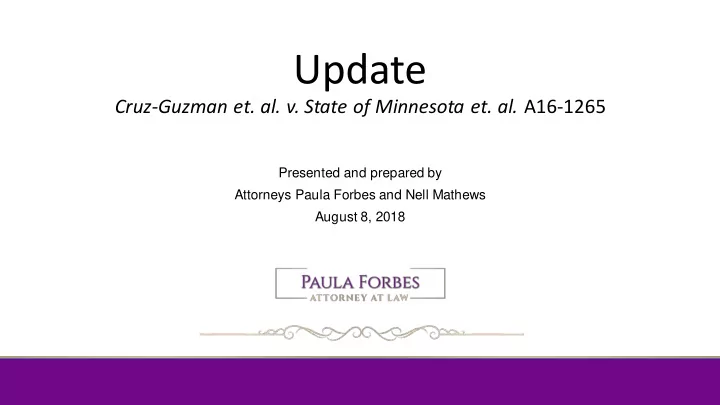

Update Cruz-Guzman et. al. v. State of Minnesota et. al. A16-1265 Presented and prepared by Attorneys Paula Forbes and Nell Mathews August 8, 2018
Procedural History Plaintiffs Complaint Plaintiffs (primarily parents of children enrolled in MPS and SPPS) bring class action complaint against the State of MN, MN Senate and House, MDE and Dr. Cassellius -November 2015 claiming: • MPS and SPPS are segregated based on race and students in poverty, • These students are not achieving, • Students have a fundamental right to an adequate education under the Minnesota Constitution, • Defendants have violated the Education, Equal Protection and Due Process Clauses of the MN Constitution because the State has allowed certain actions by surrounding school districts (open enrollment, charter schools, drawing of boundary lines, use of integration dollars), • Remedy requested is a finding that State has not met its constitutional duty.
Procedural History Defendants Motion to Dismiss State does not answer the Complaint, but files a motion to dismiss stating: • There is no fundamental right to an adequate education under the state constitution, • Plaintiffs raise issues that are the responsibility of the legislature and are therefore not justiciable (cannot be decided by the courts because of separation of powers), • Legislature has immunity for its actions and, • Indispensable parties (school district and charter schools) have not been made a party to the action.
District Court decision District Court Judge issues an opinion: • Dismissing the Human Rights Act claim and some individual state actors (governor, head of senate and house), • Allowing the educational claims to go forward, • Holds that the immunity claim does not apply, • School districts and charter schools are not indispensable parties, so they do not need to be joined.
State and Plaintiffs appeal to the Court of Appeals Court of Appeals issues a decision dismissing the matter holding: • Plaintiffs’ educational claim is based on a qualitative standard (“adequate education”), which must be established/defined, by the legislature. • All claims (including Equal Protection and Due Process) arise out of the adequacy in education claim. Therefore the matter is not justiciable (cannot be decided by the Court) but is a matter for the legislature. • The Court of Appeals did not address immunity or indispensable party issues.
Plaintiffs appeal. State cross appeals. Minnesota Supreme Court accepts certiorari. Numerous parties submit amicus briefs (friend of the court) to assist the court in its analysis.
Supreme Court Decision Supreme Court reversed the Court of Appeals and reinstated the Matter holding: • Education Clause of the state constitution establishes that the Legislature has a duty (which is a mandate, not just a grant of power) to “establish a general and uniform system of public schools.” • Funding shall be provided “as will secure a thorough and efficient system of public schools throughout the state.”
Cont. • The fundamental right recognized is “a right to a general and uniform system of education that is thorough and efficient, that is supported by sufficient and uniform funding, and that provides an adequate education to all students in Minnesota” (Opinion at p.17), • The judiciary decides whether the Legislature has complied with the constitutional mandate, • Legislature must meet a baseline level or it has not fulfilled the duty to provide an adequate education, • The Court references Pauley v. Kelly (also addressed in Skeen) regarding measures of qualitative assessment.
Adequacy Plaintiffs/Appellants claims require the court to determine whether the Legislature has violated its duty to provide: • A “general and uniform system of public schools”, • That is “thorough and efficient” and, • “Ensures a regular method throughout the state, whereby all may be enabled to acquire an education which will fit them to discharge intelligently their duties as citizens of the republic.
Equal Protection and Due Process Plaintiffs/Appellants claims are based on allegations that: • Students “are confined to schools that are separate and segregated,” that “such schools are separate and unequal” and, • The State has “engaged in or permitted” practices that “have caused or contributed to the segregation of the Minneapolis and St. Paul public schools”, • Brown provides that claims based on racial segregation in education are justiciable.
Immunity and Indispensable Parties • Legislature cannot avoid a constitutional duty/mandate by claiming immunity applies to actions taken in the legislative capacity, • Plaintiffs/Appellants seek remedies from the State, not individual school districts or charter schools, • Orfield, Education Law Center, Concerned Law Professors and ACLU points are part of Court’s analysis.
What else is important? • Split Decision-on justiciability • Inputs versus outcomes
Recommend
More recommend